Synopsis
Act 1
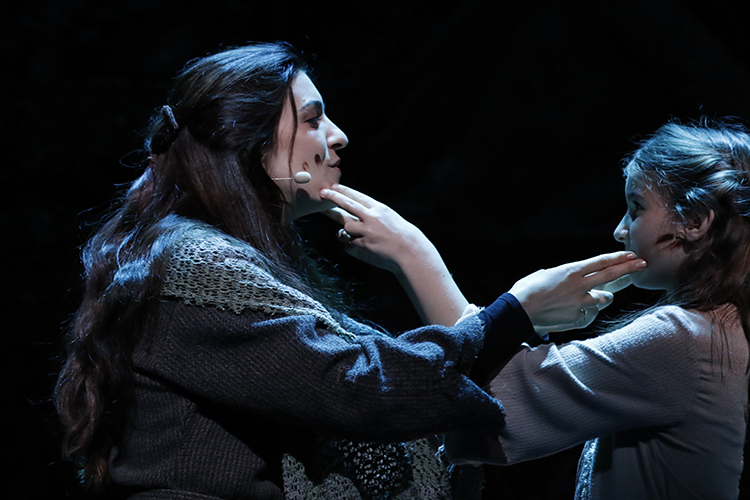 In a stormy night a little girl, Joan, seeks protection and comfort from her mother. Gudrun is a Saxon pagan who has been abducted by Joan’s father, the village priest, when on a mission and brought back to Ingelheim. As Joan’s father is once more away on a journey she persuades her mother to tell her of the forbidden pagan gods. The figures from her mother’s stories come to life in Joan’s vivid imagination – she can really see the crows Hugin and Munin, the gods’ messengers
In a stormy night a little girl, Joan, seeks protection and comfort from her mother. Gudrun is a Saxon pagan who has been abducted by Joan’s father, the village priest, when on a mission and brought back to Ingelheim. As Joan’s father is once more away on a journey she persuades her mother to tell her of the forbidden pagan gods. The figures from her mother’s stories come to life in Joan’s vivid imagination – she can really see the crows Hugin and Munin, the gods’ messengers
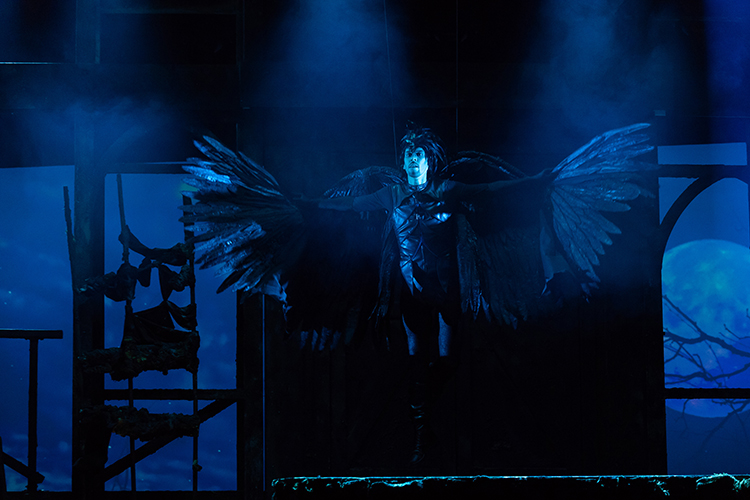
Totally unexpectedly, Joan’s father suddenly appears in the room with his son. Gudrun is completely surprised as she is not expecting him for some days. The village priest is furious because Gudrun is talking about the pagan gods. In a rage he sends the children out and attacks Gudrun. When Joan is alone she once more imagines the mythical crows before her.
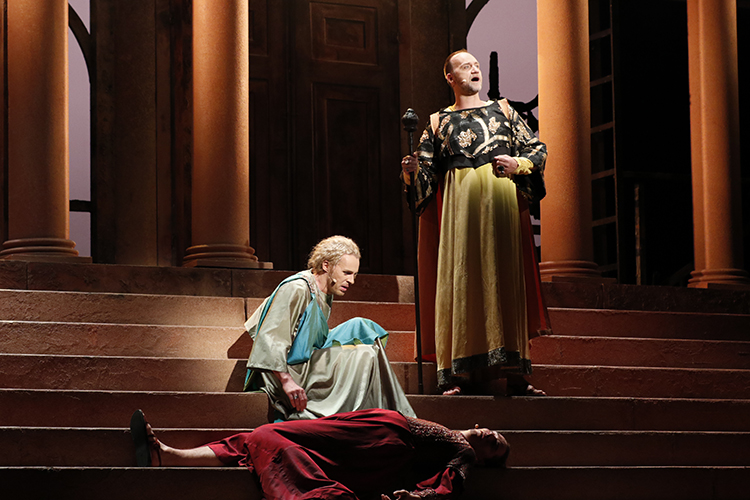 Meanwhile, in Rome, the young noble, Anastasius, is being initiated in his father’s, Arsenius’, bloody business practices: the papal official Theodorus rejects a petition from their family and Arsenius has him murdered then and there, before his son’s eyes. Arsenius explains to his shocked son that the murder is a legitimate political act and takes Anastasius’ oath to the family’s claim to power. The father has big plans for his son: one day Anatasius is to become Pope. First, he sends him to the imperial court in Aachen where he is to curry Emperor Lothar’s favour so that he will support Anastasius in becoming Pope when the time comes.
Meanwhile, in Rome, the young noble, Anastasius, is being initiated in his father’s, Arsenius’, bloody business practices: the papal official Theodorus rejects a petition from their family and Arsenius has him murdered then and there, before his son’s eyes. Arsenius explains to his shocked son that the murder is a legitimate political act and takes Anastasius’ oath to the family’s claim to power. The father has big plans for his son: one day Anatasius is to become Pope. First, he sends him to the imperial court in Aachen where he is to curry Emperor Lothar’s favour so that he will support Anastasius in becoming Pope when the time comes.
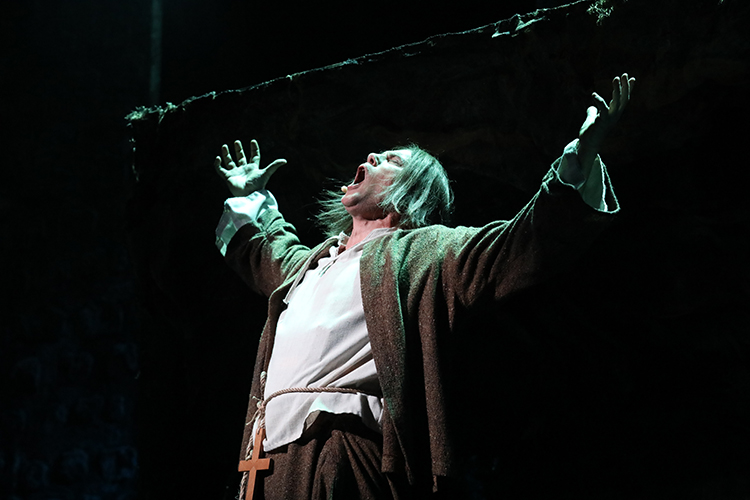 In Ingelheim Joan‘s talent is discoverd by the travelling scholar, Aeskulapius who has actually come to take her brother, Johannes, to the cathedral school in Dorstadt. However, after Joan uses the opportunity to show her abilities, Aekulapius wants to present her at the cathedral school. Her father refuses to agree and sends the scholar away. The village priest simply cannot imagine that a girl can read and write and, in the belief that he must drive the devil out of her, he brutally beats Joan.
In Ingelheim Joan‘s talent is discoverd by the travelling scholar, Aeskulapius who has actually come to take her brother, Johannes, to the cathedral school in Dorstadt. However, after Joan uses the opportunity to show her abilities, Aekulapius wants to present her at the cathedral school. Her father refuses to agree and sends the scholar away. The village priest simply cannot imagine that a girl can read and write and, in the belief that he must drive the devil out of her, he brutally beats Joan.
In the following night Joan and Johannes run away from home in order to escape from their tyrannical father. They join Aeskalpius who is camping nearby with his fellow travellers.
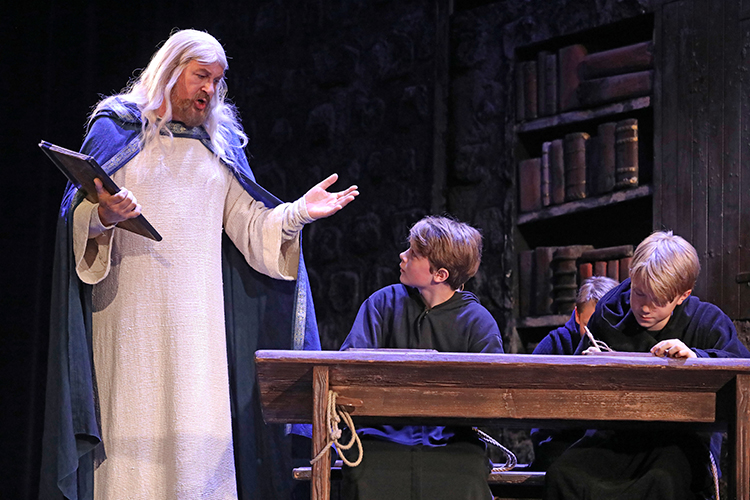 Aeskulapius takes the children to Dorstadt and presents them to the bon vivant Bishop Fulgentius who is just enjoying an exuberant party. He is surprised by the idea of a girl being taught at the cathedral school. The bishop also has a guest who reinforces his doubts: the Roman noble, Anastasius, is convinced of the mental inferiority of women.
Aeskulapius takes the children to Dorstadt and presents them to the bon vivant Bishop Fulgentius who is just enjoying an exuberant party. He is surprised by the idea of a girl being taught at the cathedral school. The bishop also has a guest who reinforces his doubts: the Roman noble, Anastasius, is convinced of the mental inferiority of women.
On the suggestion of Lord Gerold, Anastasius agrees to test Joan‘s knowledge, sure in the certainty that she will fail. He must, however, accept that his opinion has been wrong: in front of the assembled company the young girl proves her intelligence and Anastasius’ ignorance. Fulgentius then allows Joan to enter the school and puts her under the care of Lord Gerold, much to the disapproval of his wife, Richild.
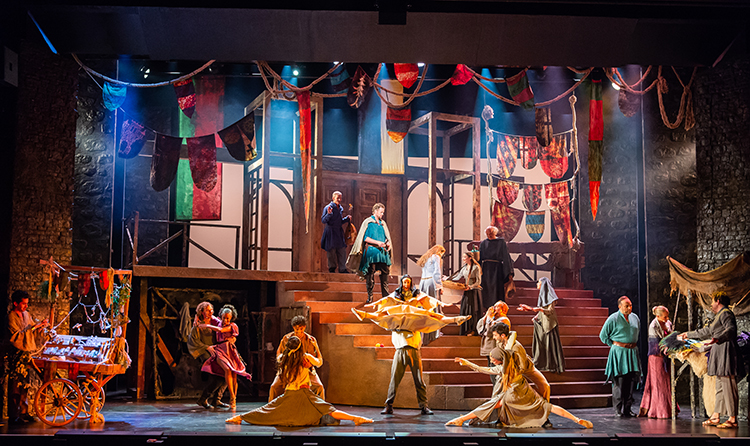 At the cathedral school Joan makes very good progress, but she is bullied by the schoolboys because, being a girl, she is not accepted. As Aeskalpius, who has always supported her, announces that he is going to enter papal service in Rome, she is grief-strucken. Gerold manages to cheer up the young woman by offering to take her on an excursion to the fair in St. Denis with his followers. The next day, in the midst of the bustling market, Joan has a mysterious encounter: a fortune-teller promises her great power, but also ruin and suffering.
At the cathedral school Joan makes very good progress, but she is bullied by the schoolboys because, being a girl, she is not accepted. As Aeskalpius, who has always supported her, announces that he is going to enter papal service in Rome, she is grief-strucken. Gerold manages to cheer up the young woman by offering to take her on an excursion to the fair in St. Denis with his followers. The next day, in the midst of the bustling market, Joan has a mysterious encounter: a fortune-teller promises her great power, but also ruin and suffering.
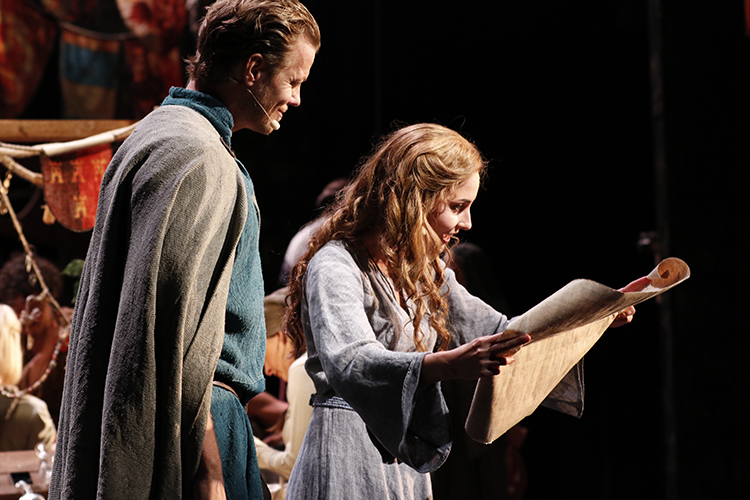 At the fair Gerold buys pergament rolls for Joan on which there are drawings of an ancient hydraulic system. After some days working in secrecy, Gerold succeeds in building the system and when they are in the middle of a wood he surprises Joan with it. Elevated by the success of this undertaking they declare their love to each other, but these tender moments are observed by Richild.
At the fair Gerold buys pergament rolls for Joan on which there are drawings of an ancient hydraulic system. After some days working in secrecy, Gerold succeeds in building the system and when they are in the middle of a wood he surprises Joan with it. Elevated by the success of this undertaking they declare their love to each other, but these tender moments are observed by Richild.
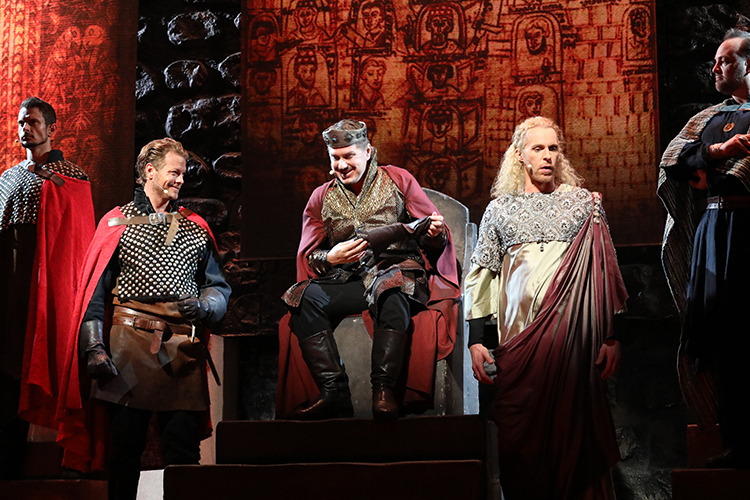 Gerold announces that he will leave to command the imperial troops and Richild uses his absence to be rid of Joan out of the way: she arranges for her to be married to the son of the blacksmith. Gerold knows nothing of all this. At the imperial court he is trying to counter the intrigues of an old acquaintance: Anastasius has ,in the meantime, become a trusted advisor of Emperor Lothar and he attempts to persuade the fickle ruler to march on Rome. Anastasius has only one goal – to use this attack to get himself appointed as Pope. Gerold manages to dissuade Lothar from carrying out this reckless political manoeuvre – much to the anger of Anastasius.
Gerold announces that he will leave to command the imperial troops and Richild uses his absence to be rid of Joan out of the way: she arranges for her to be married to the son of the blacksmith. Gerold knows nothing of all this. At the imperial court he is trying to counter the intrigues of an old acquaintance: Anastasius has ,in the meantime, become a trusted advisor of Emperor Lothar and he attempts to persuade the fickle ruler to march on Rome. Anastasius has only one goal – to use this attack to get himself appointed as Pope. Gerold manages to dissuade Lothar from carrying out this reckless political manoeuvre – much to the anger of Anastasius.
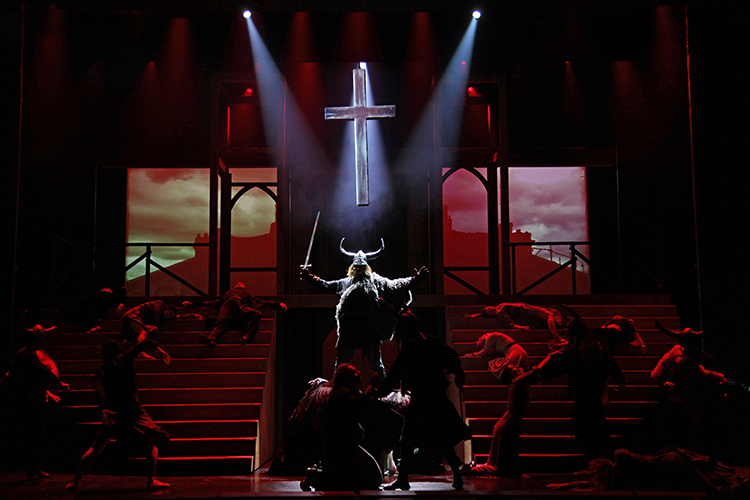 Just as Joan is kneeling before the altar with the wedding guests all around her, a horde of Normans storms into the church. The bloodthirsty warriors slaughter the whole congregation. Only Joan can hide in time. In this seemingly hopeless situation she calls on her imaginary guardians, Hugin and Munin, for protection. She is the only survivor, but her life is nevertheless in pieces. To make things worse, she also believes that Gerold has left her in the lurch. Driven to extreme measures, she adopts the role of her brother, John, who has died in the attack and makes her way to the monastery in Fulda. Yet to carry out this plan she must pretend to be a man.
Just as Joan is kneeling before the altar with the wedding guests all around her, a horde of Normans storms into the church. The bloodthirsty warriors slaughter the whole congregation. Only Joan can hide in time. In this seemingly hopeless situation she calls on her imaginary guardians, Hugin and Munin, for protection. She is the only survivor, but her life is nevertheless in pieces. To make things worse, she also believes that Gerold has left her in the lurch. Driven to extreme measures, she adopts the role of her brother, John, who has died in the attack and makes her way to the monastery in Fulda. Yet to carry out this plan she must pretend to be a man.
Act 2
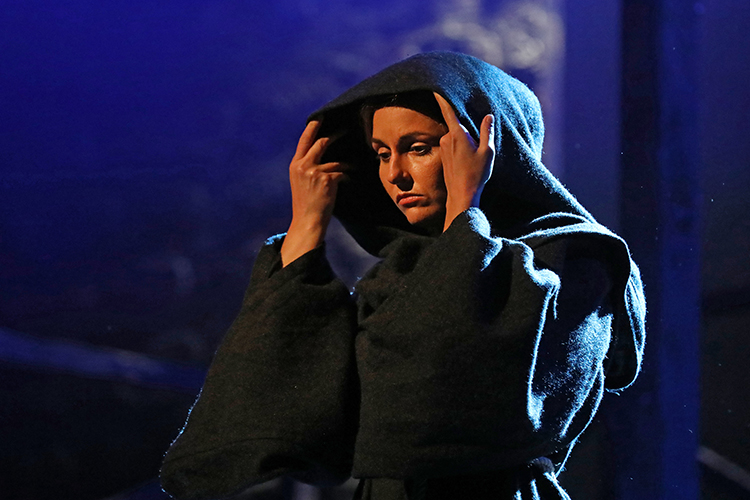
In her disguise, Joan manages to be accepted into the Fulda monastery and, as Brother John, she becomes a successful doctor. Particularly Abbot Rabanus appreciates her intelligence and education, because she is of invaluable help in setting up the abbot’s library.
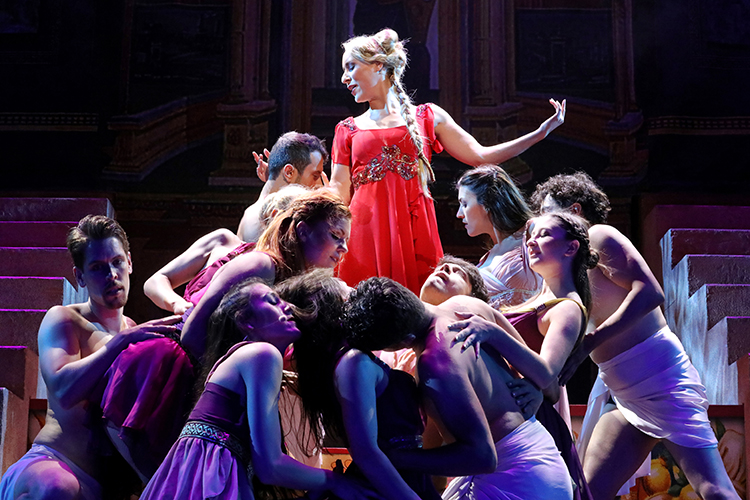
Anastasius has meanwhile returned from Rome in order to continue to follow his ambitions with his father’s assistance. Arsenius introduces him to the social circle of the courtesan Marioza, in whose brothel the powerful people of the city meet for business and pleasure. For a substantial fee Marioza secures Anatasius a position in close proximity to the Pope.
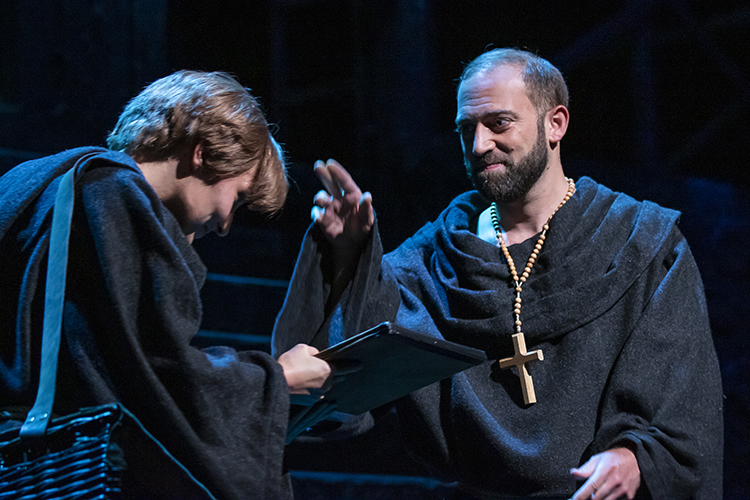 In the Fulda monastery Joan is visited by her father who has come with the intention of seeing his son, John. During an argument Joan’s father discovers her secret, but before he can reveal it to others he suffers a fatal heart attack. For Joan the only explanation for this twist of fate is that the two crows have intervened for her.
In the Fulda monastery Joan is visited by her father who has come with the intention of seeing his son, John. During an argument Joan’s father discovers her secret, but before he can reveal it to others he suffers a fatal heart attack. For Joan the only explanation for this twist of fate is that the two crows have intervened for her.
Abbot Rabanus also learns of Joan’s true identity, but does not betray her. Following the abbot’s instructions, Joan flees, joining a group of pilgrims on the way to Rome.
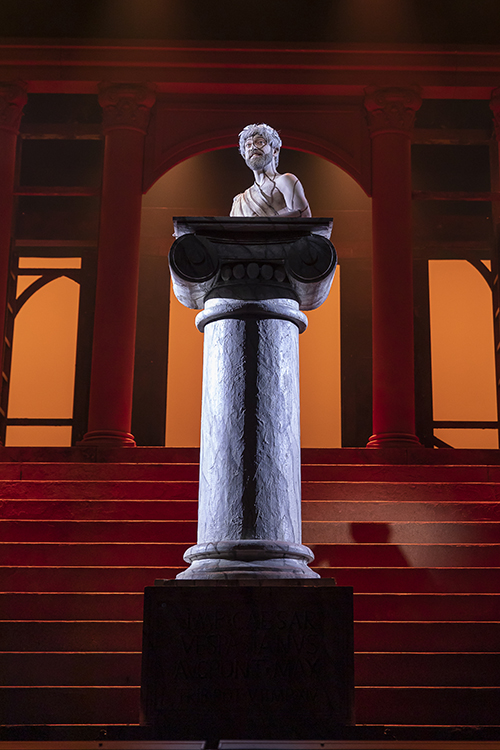 After some time Joan has established herself as a doctor in Rome, but she suffers from loneliness because she must hide her true identity. Yet she has gained an excellent reputation as a doctor under the name John Anglicus and soon even receives requests from the Lateran Palace. Pope Sergius becomes ill and, by coincidence, Aeskulapius, now the papal master of the household, asks the young doctor to treat the Pope.
After some time Joan has established herself as a doctor in Rome, but she suffers from loneliness because she must hide her true identity. Yet she has gained an excellent reputation as a doctor under the name John Anglicus and soon even receives requests from the Lateran Palace. Pope Sergius becomes ill and, by coincidence, Aeskulapius, now the papal master of the household, asks the young doctor to treat the Pope.
In the meantime, Anastasius has become a cardinal and is managing the Pope’s official business from the Pope’s sickbed according to his own interests. This situation is of great advantage to him, so he is not in the least interested in the Pope recovering, Joan (as John Anglicus) reluctantly agrees to treat Sergius. Aeskulapius recognises his former pupil and asks her to remain in disguise in the Lateran Palace.
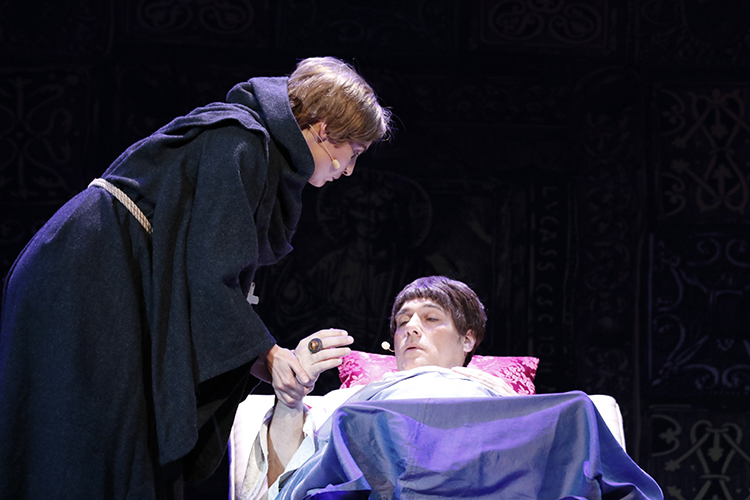
Joan puts all her efforts into healing the Pope and is rewarded with an unexpected promotion. As a close confidant of the Pope she manages to promote the people’s interests in Sergius’ political agenda. The Roman people acclaim John Anglicus as their spokesman, but misfortune is already brewing: Emperor Lothar is marching on Rome. In the background Anastasius is again pulling strings.
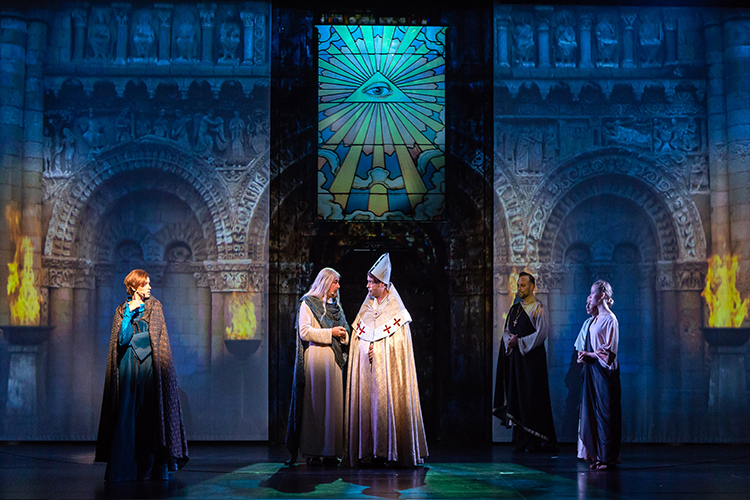 In preparation for when Lothar marches into Rome with his troops, Joan has erected the hydraulic device which Gerold and she had researched many years before. The doors of St. Peter’s open and close as if on God’s command. Lothar’s followers are convinced that they are witnessing a miracle and submit themselves to the Pope. Emperor Lothar can do nothing else, but to recognise the supremacy of the Pope.
In preparation for when Lothar marches into Rome with his troops, Joan has erected the hydraulic device which Gerold and she had researched many years before. The doors of St. Peter’s open and close as if on God’s command. Lothar’s followers are convinced that they are witnessing a miracle and submit themselves to the Pope. Emperor Lothar can do nothing else, but to recognise the supremacy of the Pope.
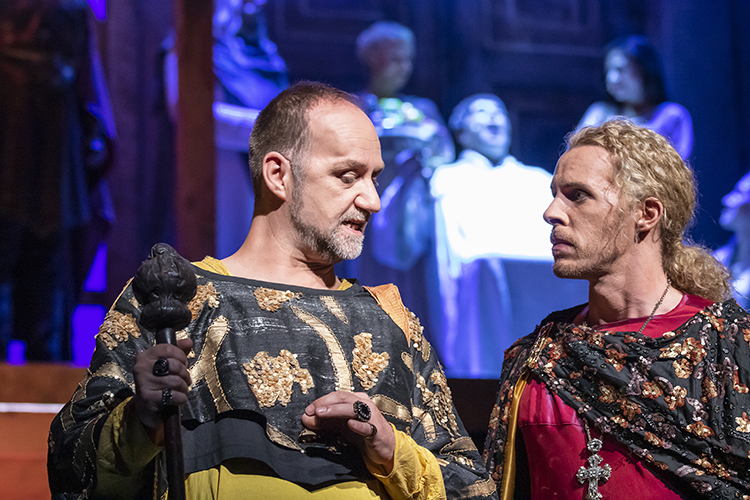 Gerold is also among the imperial troops who have come to Rome. He immediately recognises the antique construction and knows that Joan must be behind the ploy. Gerold, who is overjoyed, can convince Joan during an argument that Richild’s accusations were nothing but lies.
Gerold is also among the imperial troops who have come to Rome. He immediately recognises the antique construction and knows that Joan must be behind the ploy. Gerold, who is overjoyed, can convince Joan during an argument that Richild’s accusations were nothing but lies.
Once again Anastasius fails to achieve his goal to become Pope. Arsenius, however, has already initiated his next conspiracy: he arranges for the Pope to be poisoned during a feast. At the same time he sets a trap for John Anglicus and gets him (Joan) arrested. Arsenius and Anastasius celebrate their success.
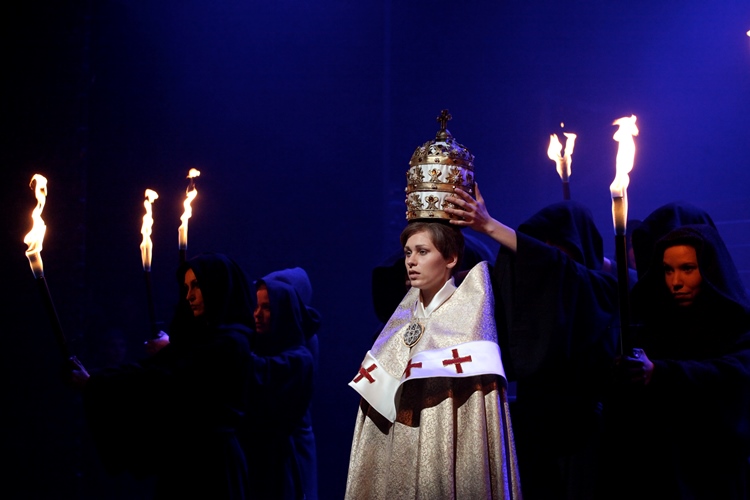
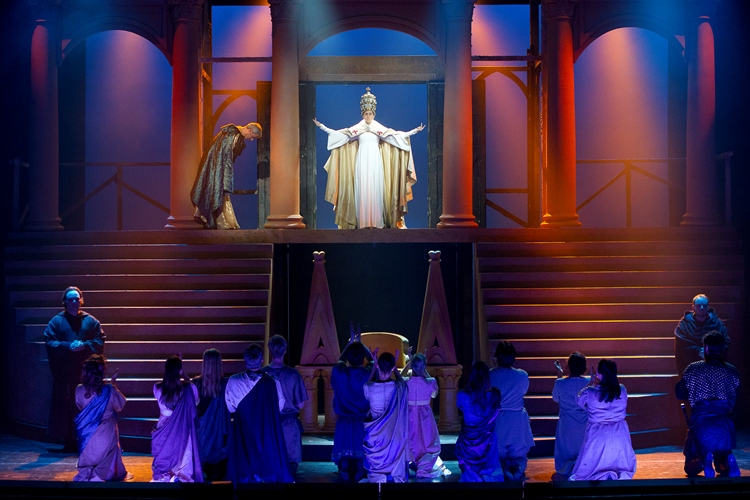 The crowd cheers ecstatically when Pope John is presented to the Roman people. He is acclaimed as the Papa Populi, the People’s Pope. True to her name, Joan immediately starts to improve the conditions of life for the people. Anastasius rage grows immeasurably following this new setback. Ignoring his father’s reservations, Anastasius decides to employ violence at the Easter procession on the next day: he wants to seize the papal throne whatever it takes.
The crowd cheers ecstatically when Pope John is presented to the Roman people. He is acclaimed as the Papa Populi, the People’s Pope. True to her name, Joan immediately starts to improve the conditions of life for the people. Anastasius rage grows immeasurably following this new setback. Ignoring his father’s reservations, Anastasius decides to employ violence at the Easter procession on the next day: he wants to seize the papal throne whatever it takes.
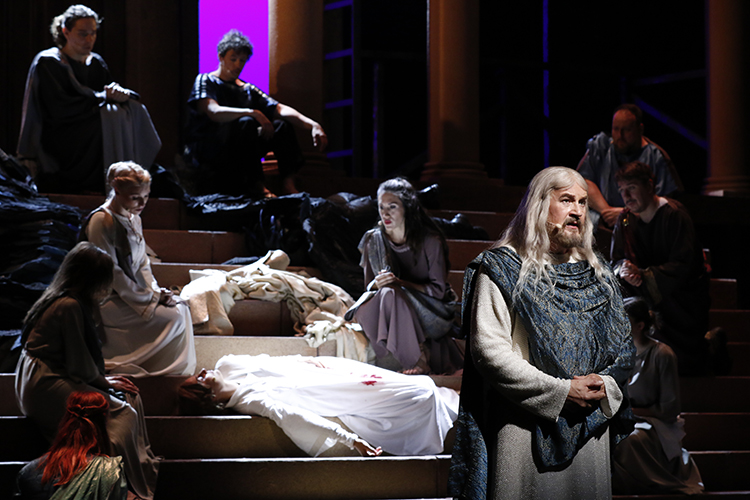 Events now take a dramatic turn for the new Pope. Joan is pregnant and decides to leave Rome after the Easter procession, but this is not to be. During the procession Anastasius gets his thugs to seize Gerold and he murders him with his own hands. Shocked by the assassination, Joan suffers a miscarriage and dies as a result of it. All the people of Rome look on incredulously as, in the throes of death, Joan shows herself to be a woman.
Events now take a dramatic turn for the new Pope. Joan is pregnant and decides to leave Rome after the Easter procession, but this is not to be. During the procession Anastasius gets his thugs to seize Gerold and he murders him with his own hands. Shocked by the assassination, Joan suffers a miscarriage and dies as a result of it. All the people of Rome look on incredulously as, in the throes of death, Joan shows herself to be a woman.
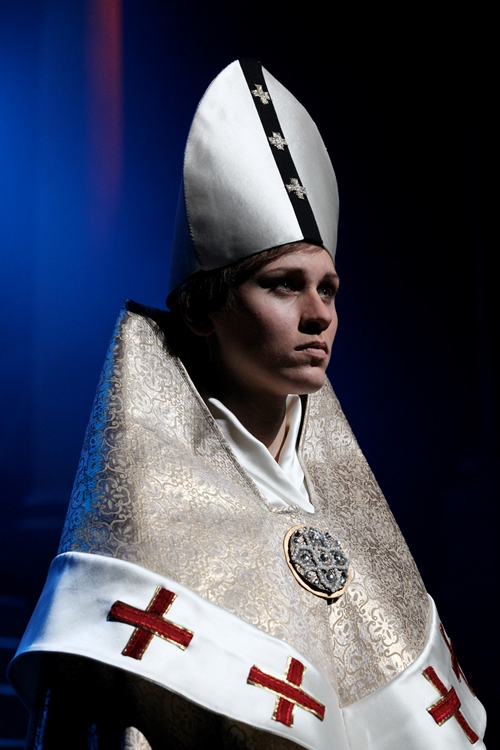 Yet she does not lose the affection of the Roman people on account of this. While the Curia attempts to blot this obvious scandal from the history books, Joan’s legend remains in the people’s memories. From now on, she is known as Pope Joan.
Yet she does not lose the affection of the Roman people on account of this. While the Curia attempts to blot this obvious scandal from the history books, Joan’s legend remains in the people’s memories. From now on, she is known as Pope Joan.


